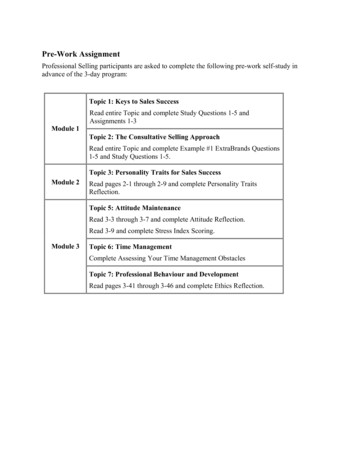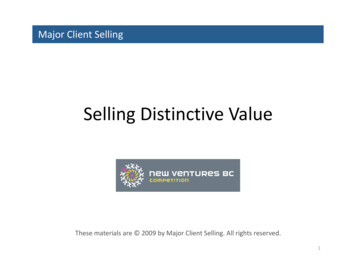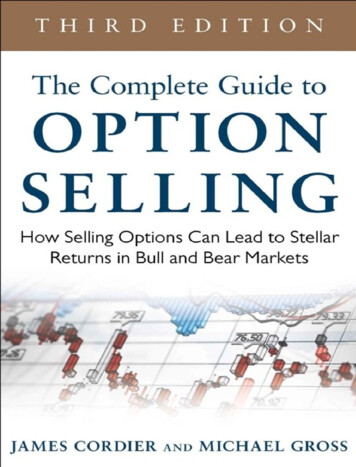
Transcription
Things To Consider WhenSelling Your HouseSUMMER 2022EDITIONCharles EliaTeam Leader, North Shore Boston GroupRE/MAX eboston.com617-209-9394
Table of Contents3Reasons To Sell This Summer5Expert Insights for Today’s Sellers7Why Sellers Are Winning Big Today9Should I Update My House Before ISell It?10 What’s Going To Happen with HomePrices This Year?12 Your Agent Is Key When PricingYour House13 Record Equity Gains Can Power YourNext Move16 Homeownership as a HedgeAgainst Inflation19 How an Agent Helps Sell Your House21 A Checklist for Selling Your House22 Reasons To Hire a RealEstate Professional
Reasons To Sell This SummerWhen you sell your house, you want to balance getting the most out of your salewith knowing you’re making a good investment on your next home. Here are afew reasons why you may want to make a move this summer and prioritizeyour homeownership goals sooner rather than later.1. The Number of Homes on the Market Is Still LowWhile data from realtor.com shows the number of listings coming to market (known inthe industry as new listings) has grown since the start of the year, housing supply is stillfirmly in sellers’ market territory. This means there are still more buyers in themarket than there are homes available. That puts you in the driver’s seat.Purchasers are eagerly waiting for your house, so if you work with a real estateprofessional to price it correctly, it could sell quickly and get multiple strong offers thisseason. Just know that listing sooner rather than later can help your house stand outbefore more sellers add their homes to the market.2. Your Equity Is Growing in Record AmountsOdeta Kushi, Deputy Chief Economist at First American, reports:“. . . homeowners in Q4 2021 had an average of 307,000 in equity – ahistoric high.”That much equity can open doors for you to make a move. If you’ve been holding off onselling because you’re worried about how rising prices will impact your next homesearch, rest assured your equity can help fuel your move. It may be just what you needto cover a large portion (if not all) of the down payment on your next home.3
3. Mortgage Rates Have Increased This YearWhile it’s true the 30-year fixed mortgage rate from Freddie Mac has climbed over twopercentage points this year, current rates are still below what they’ve been in pastdecades. Mark Fleming, Chief Economist at First American, explains:“Rising mortgage rates impact affordability, but historical context is important.An average 30-year, fixed mortgage rate of 5.5 percent is still well belowthe historical average of nearly 8 percent.”That means you still have an opportunity to lock in a rate that’s comparatively lowerthan decades past. Work with a trusted advisor to kickstart the process so you canmake your next purchase today.4. Home Prices Are AppreciatingHome prices have been skyrocketing in recent years, thanks to the imbalance ofsupply and demand. And as long as that imbalance continues, so will the rise inhome values.What does that mean for you? If you’re selling so you can move into the home of yourdreams or downsize into something that better suits your current needs, you have anopportunity to get ahead of the curve by leveraging your growing equity andpurchasing your next home before prices appreciate further.And, once you make your purchase, you can find peace of mind in knowing any furtherhome price appreciation is growing the value of your new investment.Bottom LineJust like anything else in life, timing is a big part of any decision. If you’re thinkingabout selling your house, let’s connect so you have the expert insights you need tomake the best possible move today.4
Expert Insights forToday’s SellersReal estate experts agree: sellers have a great opportunity in front of them thisseason thanks to low housing supply, home price appreciation, and growinghome equity. These are some of the main reasons industry leaders say youshould consider selling your house this summer.““There is an ongoing housing shortage, and properly listed homes are still sellingswiftly – generally seeing a contract signed within a month.- Lawrence Yun, Chief Economist, National Association of RealtorsThe process of getting a home ready for sale traditionally involved cleaning,repairing any items needing maintenance, decluttering, and even staging. Withmany homeowners expecting a quick sale, . . . the preparation process tookless than a month for over 50% of home sellers . . . with 20% completing itin less than two weeks.- George Ratiu, Senior Economist & Manager of Economic Research, realtor.com““This imbalance between an insufficient number of owners looking to sell relative tobuyers searching for a home has led to the record appreciation of the past 12 months.- Dr. Frank Nothaft, Chief Economist, CoreLogicStrong house price appreciation typically encourages more existinghomeowners to move. As homeowners gain equity in their homes, they maybe more likely to consider using the equity to purchase a larger or moreattractive home.- Mark Fleming, Chief Economist, First American5
“While house price growth is expected tomoderate from the rapid pace of 2021,strong home buyer demand againsta backdrop of historically tightinventory of homes for sale willlikely keep appreciation positivein the coming year.”- First American
Why Sellers Are Winning Big TodayWhen selling anything, you always hope for strong demand for the itemcoupled with limited supply. In essence, when demand is high and supply islow, prices naturally rise. That’s exactly what’s happening in the housingmarket today.Here’s a look at the current imbalance in supply and demand according to the NationalAssociation of Realtors (NAR):Buyer TrafficVery StrongStrongSeller TrafficStableWeakVery WeakSource: NARNotice there's more dark blue on the left. This shows buyer traffic (demand) is strong orstable. In contrast, the lighter blues on the right indicate weak or very weak seller traffic(supply). In a nutshell, the demand for homes is greater than what’s available to purchase.7
As the maps on the previous page show, seller traffic is weak. That directly impacts housingsupply. While signs indicate housing supply is starting to rise as more sellers list their homes,inventory is still low. The graph below gives you an idea of how today’s low inventory comparesto pre-pandemic years using data from NAR on the months’ supply of homes for sale.Months Inventory of Homes for SaleIn Millions 18Jan.2019Jan.2020Jan.2021Jan.2022Source: NARWhat That Means For YouWhen there’s strong demand for an item and a limited supply of it available, the sellerhas maximum leverage. You might already realize this advantage enables you to sell at thebest possible price, but it also means you’re in a better position to get the ideal contract termsto suit your needs.That’s because there’s a chance you’ll get offers from multiple buyers who are willing to competefor your house. They’ll do everything they can to make their offer stand out. This could meanyou’ll see things like waived contingencies, offers over asking price, earnest money deposits, andmore. As the offers come in, work with your agent to look closely at each one before you decidewhich works best for you.Bottom LineThe current imbalance of supply and demand puts sellers in the driver’s seat. Let’sconnect today to discuss how much leverage you have, and why it may make sense tosell now before your house has more competition.8
9
What’s Going To Happenwith Home Prices This Year?You may be thinking of selling because you’ve heard your home’s value hasincreased. But will that trend continue? Or will prices fall since mortgage rateshave risen?History Shows Home Prices Don’t Fall When Mortgage Rates RiseWhile some people may worry the rise in mortgage rates this year will impact demand so muchthat home prices will depreciate, experts say otherwise. Doug Duncan, Senior Vice President andChief Economist at Fannie Mae, notes:“What I will caution against is making the inference that interest rates have a direct impacton house prices. That is not true.”To give you historical context, here’s a look at the impact on home prices over the past 30 yearswhen mortgage rates rose by a percentage point or more. As the chart below shows, ratesjumped by at least 1% six times in that time frame. In each case, home values increased. So, ifyou’re planning to sell, history shows rising mortgage rates have not had a negative impact onhome prices.The Impact of Rising Mortgage Rates on Home PricesStart DateEnd DateMonthsIncreaseHome PricesOct 1993Dec 1994142.38% 3%Jan 1996Sept 199681.20% 2%Oct 1998May 2000191.81% 13%June 2003June 2004121.06% 13%June 2005July 2006131.18% 7%Nov 2012Dec 2013131.11% 11%131.46% 8%AverageSource: Freddie Mac10
What’s Driving the Continued Price Growth Today?According to the U.S. Home Price Insights Report from CoreLogic, home values increased by anaverage of 15% in 2021. That dramatic rise in home prices is a direct result of more buyers in themarket (demand) than houses available for sale (supply). When demand is high and supply is lowlike it is right now, prices naturally rise.The graph below shows 2022 home price forecasts from several industry experts. The average ofthese projections indicates an expected 8.9% home price appreciation in 2022. While this isn’tquite the dramatic 15% the market experienced last year, it shows experts are calling for ongoingappreciation. Basically, experts are all indicating home values will continue to climb, just at a moremoderate pace.2022 Home Price ForecastsBased on Expert Projections10.8%10.4%Average of All Forecasts: 8.9%9.6%9.0%8.4%8.3%5.8%Fannie MaeFreddie MacCoreLogicHPESNARZelmanMBABottom LineSelling now is a great way to take advantage of today’s home price appreciation. Andwhen you buy your next home, projections for ongoing appreciation indicate it’ll be aworthwhile investment that should grow in value with time.11
12
Record Equity Gains CanPower Your Next MoveEquity can be a real game-changer if you’re planning to make a move.According to the latest data from CoreLogic, the average homeowner gained 55,300 in equity over the past year, a number that grew substantially as homevalues appreciated.Homeowner Equity Gains Over the Past YearSource: CoreLogic13
Why Equity Is Growing TodayFor a homeowner, your equity is the current value of your home minus what youowe on the loan. Today, there aren’t enough homes on the market to meet buyerdemand, so bidding wars and multiple offers are driving home values up, giving currenthomeowners a significant equity boost.The graph below uses the most recent projections from the Home Price ExpectationSurvey (HPES) by Pulsenomics to show how your household wealth is expected tocontinue building as home values rise.Potential Home Price Growth Over the Next 5 YearsBased on Projections from the Home Price Expectation Survey 392,400 411,000 426,083 440,613 456,342 96,342 360,0002022Potential growth inhousehold wealth over thenext five years based solelyon increased home equityif you purchased a 360Khome in January of 2022.20232024202520262027Source: HPES 2022 1QHow Rising Equity Impacts YouIf you’re a homeowner, equity not only builds your wealth, it also opens doors foryou to achieve your financial goals.It works like this: when you sell your house, the equity you built up comes back to youin the sale. You can use those proceeds to fuel your next move, especially if you’vedecided your needs have changed and you’re looking for something new.Bottom LineLet’s connect to determine how much equity you have in your current home andhow you can use it to help you make your next move sooner than you may havethought possible.14
“Home prices rose . . . generating a bigincrease in home equity. . . . Home equityhas historically been a major sourceof wealth.”- Dr. Frank Nothaft, Chief Economist, CoreLogic
Homeownership as a HedgeAgainst InflationIf you’re thinking about selling to make a move this summer, you may bewondering if the recent news about rising inflation should impact your plans.The good news is, history shows homeownership is usually a strong hedgeagainst inflation.Your Next Home Will Give YouLasting StabilityWith inflation reaching its highest level in 40years, it’s more important than ever to thinkabout stabilizing your expenses whereveryou can.If you want to move up into your next home,know that doing so sooner rather than latermay be the key to get what you want. Whenyou move, you can lock in your largest monthlyexpense - your mortgage payment - beforeprices climb higher. This protects you fromincreasing housing costs for the foreseeablefuture.A fixed-rate mortgage allowsyou to maintain the biggestportion of housing expenses atthe same payment. Sure,property taxes will rise andother expenses may creep up,but your monthly housingpayment remains the same.So, while prices for other goods and serviceslike groceries, gas, and more could put a pinchon your wallet, you can secure a stable housingpayment even as those other items rise in costaround you.- James Royal,Senior Investing and WealthManagement Reporter, Bankrate16
History Shows During Inflationary Periods, Home Prices Rise TooAs an added plus, history indicates your next home will likely grow in value with time. Mark P.Cussen, Financial Writer at Investopedia, explains:“Real estate is one of the time-honored inflation hedges. It's a tangible asset, andthose tend to hold their value when inflation reigns, unlike paper assets. More specifically,as prices rise, so do property values.”To help give you more context, here’s a look at how home prices have performed compared toinflation since the 1970s. When prices rise, the value of your home does too. And when you’relooking to protect yourself from rising costs, you want to be in a fixed asset that typicallyoutperforms the rate of inflation. As history shows, that makes buying your next home a greathedge during periods of high inflation.Homeownership: a Hedge Against InflationHome Price Appreciation vs. Consumer Price Increases Over the DecadesInflation Rate15%Home Price Appreciation9.9%9.2%7.1%7.0%5.6% 5.5%4.9%4%3%1970s1980s1990s2.6% 2.3%2000s1.8%2010s1.4%20202021Source: NAR, CoreLogic, Consumer Price IndexBottom LineIf you’re ready, moving sooner rather than later will put you in the best position togain from your next investment. Let’s connect if you want to better understand howmoving into your dream home could be a great long-term decision.17
“There are many advantages to investingin real estate. . . . It often acts as a goodinflation hedge since there willalways be a demand for homes,regardless of the economic climate,and because as inflation rises, so doproperty values, . . .”- Investopedia
How an Agent Helps Sell Your HouseWith today’s housing market moving as fast as it is, working with aprofessional is more essential than ever. Here are five reasons you’ll want to usea real estate advisor when you sell your home this season.1. They Know What Buyers Want To SeeBefore you decide which projects and repairs to take on, connect with a real estateprofessional. They have first-hand experience with today’s buyers, what they expect,and what you need to do to make sure your house shows well. A survey from FreddieMac finds:“. . . nearly two-in-five potential homebuyers would consider purchasing a homerequiring renovations.”A professional can use their expertise to help you make the best decisions possible foryour local market.2. They Help Maximize Your Buyer PoolWhile it’s true the average home for sale is receiving multiple offers, it’s important tounderstand your agent’s role in bringing buyers in. Real estate professionals have anassortment of tools at their disposal, such as social media followers, agency resources,and the multiple listing service (MLS) to ensure your house is viewed by the mostbuyers. According to realtor.com:“Only licensed real estate agents can list homes on the MLS, which is a onestop online shop of sorts for getting a house seen by thousands of agents andhome buyers.”Without access to these tools, your buyer pool is limited.19
3. They Understand the Fine PrintToday, more disclosures and regulations are mandatory when selling a house. That’swhy Investopedia says:“One of the biggest risks of FSBO [For Sale By Owner] is not having theexperience or expertise to navigate all of the legal and regulatory requirementsthat come with selling a home.”A real estate professional knows exactly what needs to happen, what all the paperworkmeans, and how to work through it efficiently. They’ll help you review the documentsand avoid any costly missteps that could occur if you try to handle them on your own.4. They’re Trained NegotiatorsIf you sell without a professional, you’ll also be solely responsible for the negotiations.That means you’ll have to coordinate with:The buyer, who wants the best deal possibleThe buyer’s agent, who will use their expertise toadvocate for the buyerThe inspection company, which works for the buyerand will almost always find concerns with the houseThe appraiser, who assesses the property’s value toprotect the lenderInstead of going toe-to-toe with these parties alone, lean on an expert. They’ll knowwhat levers to pull, how to address all concerns, and when to get a second opinion.5. They Know How To Set the Right Price for Your HouseReal estate professionals know the ins and outs of how to price your house accuratelyand competitively. They compare your house to recently sold homes in your area andassess the current condition of your house. These factors are key to making sure it’spriced to move quickly while still getting you the highest possible final sale price.Bottom LineThere’s a lot that goes into selling your house, and it takes time, effort, and expertise totruly do it right. Before you decide to sell your house on your own, let's discuss howhaving a professional at your side can help.20
21
22
“. . . homes are moving quickly and alot of times with all-cash offers. Thatmeans sellers can get top dollar fortheir property if they decide to list.”- realtor.com23
Let's Chat.I'm sure you have questions and thoughts about thereal estate process.I'd love to talk with you about what you've read here and help you onthe path to selling your house. My contact information is below, and Ilook forward to working with you.Charles EliaTeam Leader, North Shore Boston GroupRE/MAX eboston.com617-209-9394SUMMER 2022 EDITION
real estate process. I'd love to talk with you about what you've read here and help you on the path to selling your house. My contact information is below, and I look forward to working with you. Charles Elia Team Leader, North Shore Boston Group RE/MAX Renaissance charlesjameselia@gmail.com www.northshoreboston.com 617-209-9394 SUMMER 2022 EDITION











